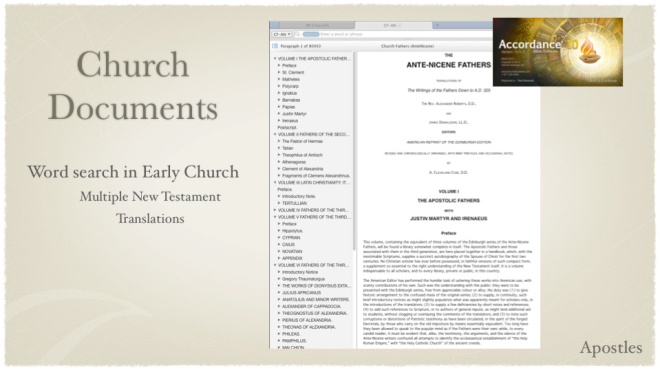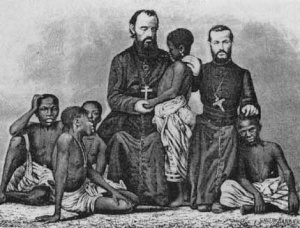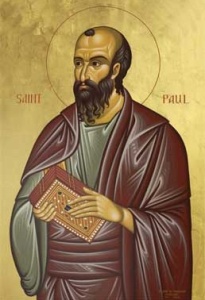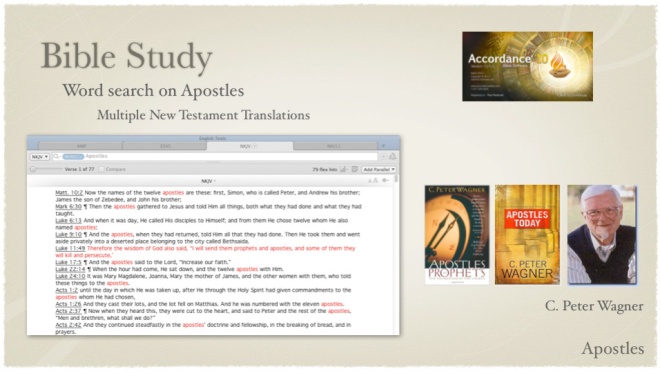Is God restoring the gift and office of apostle? After studying it, I believe He is and that it matters. If you are engaging in a battle, wouldn’t you want to know that those leading the charge are ordained, trained, given God’s authority (for a territory), and hear God for strategy? I would, and I believe the office is being restored.
As an elder in a church I was told that the bible doesn’t give guidance about church governance. This ignores Ephesians 2:20 that says the church is built on the foundation apostles and prophets. 1 Corinthians 12:28 says God appointed these in the church: first apostles, second prophets, third teachers. Ephesians 4:11 states that Jesus gave some to be apostles, some prophets. Apostle is used 74 times in the new testament, teacher – 14 times, prophet – 8 times, evangelist 4 – times and pastor only 3 times. In the battle, if an enemy could get God’s army – the church – to deviate from God’s structure, it would go a long way to assuring defeat.
In many parts of the world, where the church is growing (Africa and Asia especially) the office of apostle is accepted and established. In the west, Protestant churches especially have been influenced by cessation theology and Calvin’s teaching that apostles were temporary. (see reference).
This study of apostles addresses the following questions:
- Wanting all that God has for me and us – especially in the context of being part of His Body.
- Curiosity about the condition of the church.
– faithful church-goers should grow spiritually, but often don’t
– churches’ societal and political influence is weak - Validating New Apostolic Reformation’s use of the term
– the assertion that this change of church government is on the same level or greater than the Protestant Reformation
– contemporary usage (John & Sheryl Price’s and Chuck Pierce use the titles) - Are/were there apostles beyond just the twelve or capital ‘A’ apostles?
- If apostles are important (foundational), then they would have been functioning in the early church (when the church was a world changer), and there should be evidence in the writings of the early church.
My study utilized Accordance Bible Software’s database search function to find instances for ‘apostle’ in scriptures, and early church documents. I also read 2 books (Apostles and Prophets & Apostles Today by Dr. Peter Wagner.

There are over 6000 uses of the word apostle in the writings of the early church fathers. Highlights below.
The Twelve
Our Lord originally appointed twelve apostles as his initial Church community, commissioned with the task of sharing the faith. The Apostles’ names are listed at Matthew 10:2, Mark 3:14, Luke 6:12, Acts 1:13, 26. The Twelve hold a special place in the founding of the church. They sacrificed everything and are capital ‘A’ apostles.
- Simon Peter – crucified
- Andrew the First-called – brother of Peter; crucified
- James (son of Zebedee) – also called “the Great”; beheaded
- John the Theologian – brother of James; reposed in a miraculous manner
- Philip – crucified
- Bartholomew – also called Nathaniel; crucified, flayed and beheaded
- Thomas – pierced with five spears
- Matthew – also called Levi, brother of James; burned alive
- James (son of Alphaeus) – crucified
- Jude – surnamed Thaddeus, brother of James the brother of God; crucified
- Simon the Zealot – crucified
- Matthias – replaced Judas Iscariot; stoned and beheaded
– – –
Apostles specifically mentioned in New Testament in addition to the twelve include: Barnabas, Andronicus, Junias (a woman) and Epaphroditus.
Acts 14:14 – But when the apostles Barnabas and Paul heard of it, they tore their robes and rushed out into the crowd. . .” Paul is regularly accepted as a capital ‘A’ apostle, but Barnabas is also included since apostles is plural.
Rom. 16:7 – Greet Andronicus and Junias, my kinsmen and my fellow prisoners, who are outstanding among the apostles, who also were in Christ before me.
Phil. 2:25 – But I have thought it necessary to send to you Epaphroditus, my brother and fellow labourer and fellow soldier, but your apostle: and he that hath ministered to my wants. (Apostle here is strong’s G0652.)
Also consider:
James, the Lord’s brother, was regarded as the apostle of Jerusalem and acted with apostolic authority in the early church. Acts 15:6 The apostles and the elders were gathered together to consider this matter. See through Acts 15:22.
1Th. 1:1 Paul, Silvanus, and Timothy, To the church of the Thessalonians in God the Father and the Lord Jesus Christ: Grace to you and peace. The three are later referred to in the use of ‘we’ in 1Th. 2:6 Nor did we seek glory from men, either from you or from others, when we might have made demands as apostles of Christ.
Titus acted as an apostle in: Titus 1:5 For this reason I left you in Crete, that you should set in order the things that are lacking, and appoint elders in every city as I commanded you.
– – –
1Cor. 15:3-9 After his resurrection, Jesus was seen by:
- Cephas (Peter)
- then by the twelve.
- After that He was seen by over five hundred brethren at once,
- After that He was seen by James (Jesus’ brother),
- then by all the apostles.
- Then last of all He was seen by me also, as by one born out of due time. For I am the least of the apostles, who am not worthy to be called an apostle.
Note how ‘all the apostles’ is a group in addition to the twelve. Orthodox tradition maintains that the seventy (70) sent by Jesus in Luke 1:1-6 were all apostles.
– – –
False Apostles
Paul wrote there were false apostles. 2 Cor. 11:13 For such are false apostles, deceitful workers, transforming themselves into apostles of Christ.
In Rev. 2:2 Jesus addresses the church of Ephesus with: “…you have tested those who say they are apostles and are not, and have found them liars”
If apostles were limited to those capital ‘A’ commonly accepted – wouldn’t they be recognized? Why would a church be commended for discerning false apostles? Today, false apostles create problems, making it easier to avoid the issue.
– – –
Early Church Apostles
The Apostles (capital ‘A’) left instructions for apostles. In the ANTE-NICENE FATHERS (The Writings of the Fathers to 325 AD) is ‘The Didache’. It is considered the first example of the genre of the Church Orders. The text, parts of which constitute the oldest surviving written catechism, is a very credible early church document, has three main sections dealing with Christian ethics, rituals such as baptism and Eucharist, and Church organization.
There is a chapter entitled: “The Apostles Teaching on Apostles Prophets and Teachers”
“3. But concerning the apostles and prophets, according to the decree of the Gospel, thus .. . . 4. Let every apostle that cometh to you be received as the Lord. 5. But he shall not remain except one day; but if there be need, also the next; but if he remain three days, he is a false prophet. 6. And when the apostle goeth away, let him take nothing but bread until he lodgeth; but if he ask money, he is a false prophet… But whoever saith in the Spirit, Give me money, or something else, ye shall not listen to him; but if he saith to you to give for others’ sake who are in need, let no one judge him.”
In Apostolic Fathers english translation by Lightfoot, MPoly 16:2 mentioned Polycarp.
“the glorious martyr Polycarp, who was found an apostolic and prophetic teacher in our own time, a bishop of the holy church which is in Smyrna. For every work which he uttered was accomplished and will be accomplished.”
The Ancient Syriac Document (Church Fathers AnteNicene) has a section entitled the Teaching of Addaeus the Apostle.
Apostle Symeon, second Bishop of Jerusalem, serving for the period of 67 to 107 is also noted in these writings.
As the church became more defensive about false doctrine, the focus on the Apostles’ teaching concentrated the church’s attention to the more limited twelve (plus Paul). For example Ireneaus’ Against Heresies Chapter IV states:
“The Truth is to Be Found Nowhere Else But in the Catholic Church, the Sole Depository of Apostolical Doctrine. Heresies are of Recent Formation, and Cannot Trace Their Origin Up to the Apostles.”
The church left a Hebrew mindset for a Greek one and Constantine made Christianity the state religion – the rest is history. The decline is well documented into the dark ages. Calvin’s commentaries were a reaction to the Catholic church (Papists), and his view that apostles were temporary could have been a reaction to an authoritarian government – which apostles represented.
– – –
Apostles Through the Centuries

Apostle means one sent as a messenger or agent. In the expanding church, it is likely that many of the apostles were exploring new frontiers to take the gospel of the Kingdom of God to new territories. They were spiritually sensitive pioneers and many left for new regions and were never heard from again. They took a victorious culture to new areas.
Notable apostles include:
Apostle to India: Saint Thomas
Apostle to the Abyssinians: Saint Frumentius
Apostle of the Ardennes: Saint Hubert, 656-727
Apostle to the Armenians: Saint Gregory the Illuminator, 256-331
Apostle of Carpatho-Russia: Saint Alexis Kabaliuk, 1877-1947
Apostle to Karantania: Bishop Virgilius of Salzburg, 745-784
Apostle to the English: Saint Augustine, died 604
Apostle to the Franks: Saint Denis, 3rd century
Apostle to the Franks: Saint Remigius, ca. 437-533
Apostle to the Frisians: Saint Willibrord, 657-738
Apostle to the Gauls: Saint Irenaeus, 130-200
Apostle to the Gauls: Saint Martin of Tours, 338-401
Apostle to the Gentiles: Saint Paul
Apostle to the Germans: Saint Boniface, 680-755
Apostle to the Goths: Bishop Ulfilas
Apostle to Hungary: Saint Anastasius, 954-1044
Apostle to India: Saint Thomas
Apostle to Ireland: Saint Patrick, 373-463
Apostle to Noricum: Saint Severinus
Apostle to the North: Saint Ansgar, 801-864
Apostle to the Picts: Saint Ninian, 5th century
Apostle to the Scots: Saint Columba, 521-597
Apostle to the Slavs: Saint Cyril, ca. 820-869
Apostle to the Slavs: Saint Methodius
Apostle to Spain: Saint James the Great, d. 44
– – –
Apostles Today
- A spiritual gift that = strong influence
- An assignment/call within a sphere
- Extraordinary character (blameless)
- Followers who value the relationship
- Vision — knowing what God wants to do and how to accomplish it
What Apostles Do
- Receive Revelation
- Cast vision
- Birth new things
- Impart
- Build
- Govern
- Teach
- Send
- Equip
- War
- Finish
- Long-term perspective
– – – – – – – – References – – – – – – – –
Calvin’s commentary on Ephesians 4:11 “Apostles, Evangelists, and Prophets were bestowed on the church for a limited time only, except in those cases where religion has fallen into decay, and evangelists are raised up in an extraordinary manner, to restore the pure doctrine which had been lost. But without Pastors and Teachers there can be no government of the church.” How arbitrary, you should ask if Calvin’s interpretation supersedes the clear statements of scripture?
Back to top


